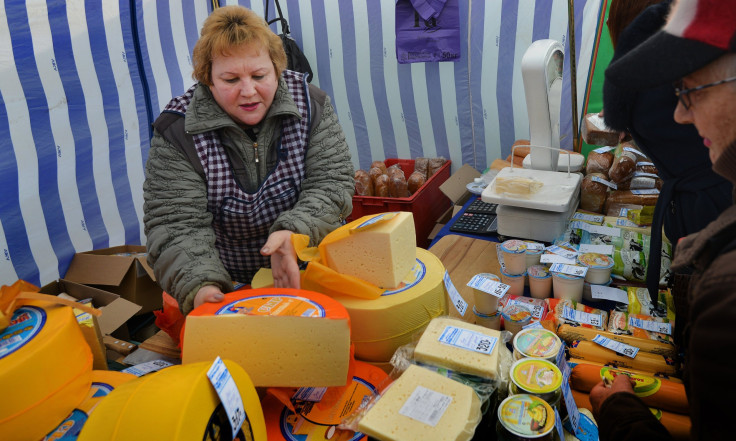Russian Food Sanctions 2015: Meat, Cheese Shortage Feared Amid EU Embargo Over Ukraine Conflict

Russia may experience meat and dairy shortages in 2016, Russian news agency Ria Novosti reported Tuesday, citing a government spending watchdog in the country. The nation used to import hundreds of tons of foreign food, mostly from Europe, and ongoing European sanctions could shrink Russia's food supply.
The United States and the European Union issued trade embargoes with Russia in March 2014, following Russia's annexation of the Crimean peninsula and alleged military support for pro-Russian separatists in eastern Ukraine. Russia issued its retaliatory sanctions shortly after.
The impact of the sanctions has crippled the Russian economy while leaving noticeable holes in the refrigerators of average Russians. The country long imported tons of French cheese every year, as well as a variety of meat and fresh produce from throughout the EU.
#Russia May Face #Meat, #Dairy #Deficit Next Year | @MoscowTimes https://t.co/dMRe6YJ06C #food #sanctions #Ukraine pic.twitter.com/a1GHbTbjHt
— Paul Erickson (@epaulnet) November 4, 2015Russians have bemoaned the loss of some of their favorite products, and an expansive smuggling system has arisen in response. One man was stopped on a western border in July trying to smuggle 1,000 pounds of cheese in his car. President Vladimir Putin has ordered the destruction of several tons of Western food in symbolic displays to demonstrate the country's self-sufficiency.
The nation has struggled to come up with alternatives to imported meat and cheese, however. Around 25 percent of all food products and 80 percent of all cheese in Russia are technically counterfeit, according to the Moscow Times. The foods are often imitation products. The vast majority of Russian cheese, for instance, is not technically cheese but a substance made with palm oil to mimic a cheese-like consistency, similar to that from which vegan cheese is made.
With nearly 23 million people living in poverty -- up 3 million from 2014, according to one Moscow Times report -- the food shortage will be an urgent problem for millions of Russians.
© Copyright IBTimes 2024. All rights reserved.






















